Rabbinical Class of 2024/5784 Scholarship & Statements
Dear Beloved Family, Friends, and Community,
As we approach our ordination, we are reflecting on our journey through the exceptional Hebrew College community. We’ve been nurtured by extraordinary teachers, embraced by a diverse and pluralistic environment, and supported unconditionally by you: our family, friends, and community members.
Our journey through rabbinical school has unfolded amidst unparalleled global challenges and uncertainties, underscoring the critical need for resilient rabbinic leadership in these times more than ever. Through these times, the strength of our cohort, our love for Torah, and the unwavering support of the Hebrew College community have been our pillars.
Inspired by our transformative experience, we are committed to paying it forward. In celebration of our ordination, we are hoping to raise $20,000 in scholarship funds for an incoming student at Hebrew College next year. This is our way of ensuring future students can benefit from the same nurturing environment that has been pivotal to our growth as emerging Jewish leaders.
We invite you to join us in this endeavor. Contributions can be made in honor of the Class of 2024 or an individual ordainee at the following link: Hebrew College Class of 2024 Scholarship Fund.
For those who prefer to donate by check, please address it to the Office of Advancement, Hebrew College, 1860 Washington St, Newton, MA 02466, with “HCRS Class of 2024 Gift” in the memo field.
Thank you for your continued support and blessings.
Shalom U’vracha,
The Class of 2024
(Pictured above back row l-r: Ben Einsidler, Jacob Weiss, Michael Fraade, Jessica Spencer, Michaela Brown, Heather Renetzky, Leah Carnow. Front row l-r: Hindy Finman, Eliana Willis, Jacob Chatinover, Emmanuel Cantor, Naftali Hirsch. Not pictured, Allen Lipson.)
We are proud to report 100% placement for our Class of 2024. Learn about their leadership positions in Jewish communities across the country!
Michaela Brown Associate Chaplain for Jewish (& Interfaith) Life at St. Olaf College and Carleton College, Northfield, MN
Emmanuel Cantor Community Rabbi, The Den Collective, Washington DC
Leah Carnow Assistant Rabbi, Temple Beth Zion, Brookline, MA
Jacob Chatinover Director of Congregational Learning, Congregation Bonai Shalom, Boulder, CO
Benjamin Einsidler Rabbi, Temple Beth Sholom, Framingham, MA
Hindy Finman Senior Director of Jewish Life, Pittsburgh JCC, Pittsburgh PA
Michael Fraade Chaplain, Massachusetts General Hospital, Boston, MA
Naftali Hirsch Director of Congregational Learning, Temple Beth David, Westwood, MA
Allen Lipson Organizer, Essex County Community Organization, Lynn, MA
Heather Renetzky Director of Congregational Engagement, Mt. Zion Temple, St. Paul, MN
Jessica Spencer Doctoral Program in Religion, Columbia University, New York, NY
Jacob Weiss Rabbi, Northeastern University Hillel, Boston, MA
Eliana Willis Assistant Rabbi, Temple Emunah, Lexington, MA
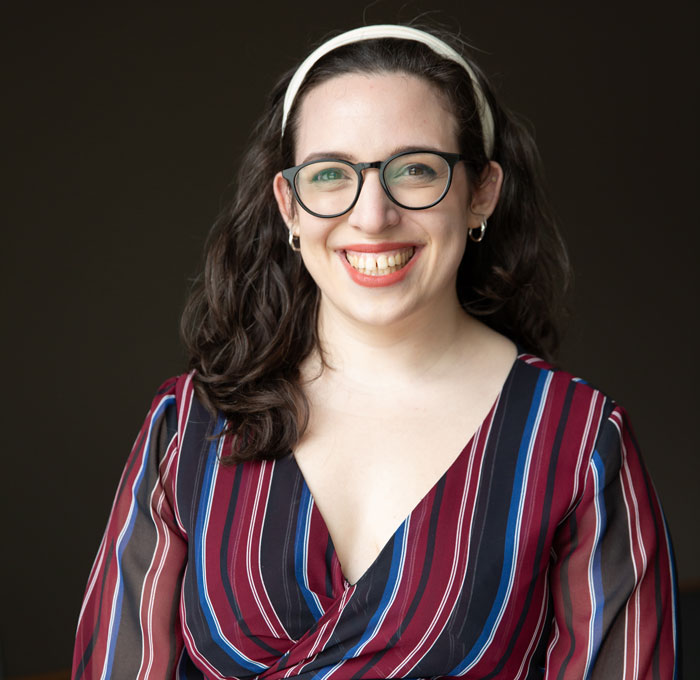
Michaela Brown
As I have approached ordination, I have been reflecting on the title that I will be receiving. Rav, Rabbi. Without precedent, I might have supposed many other titles were more appropriate. Perhaps, morah – teacher, the one who instructs our ultimate Instruction, Torah. Maybe, shomeret – guardian, the one who safekeeps our Tradition and our People. Then, there’s ro’ah – shepherd, the role described for Joshua as he is passed the mantle of leadership from Moses. Our Protestant colleagues have taken a liking to this imagery, calling their clergy “pastors.” Despite this, my ancestors selected rav. While this comes from the honorific of rav as “master,” this word, associated with the Hebrew root רבב means (to be) many, much, great.
Throughout my life, I have always felt like too much. As a young child, it was too much talking, too much energy. A teen, too studious and involved. An adult, too many feelings, caring too much about the brokenness of the world around me. Throughout the past five years, I have learned that being a rabbi is the art of being too much —holding the multitudes of ourselves, our communities, and the world.
In fact, there is a longstanding tradition of rabbis embodying just this. My classmate Risa loves to teach of Rabban Gamliel, who, in Mishnah Berakhot, identifies himself as istenis (sensitive, delicate, weak). My classmate Aron introduced me to 19th-20th century rabbi, R. Aaron Samuel Tamares z”l, whose pseudonym was: Ahad HaRabanim HaMargishim, one of the sensitive/feeling rabbis. I am honored to be joining the ranks of those who have owned their “muchness” and tapped into their overflowing well of emotion rather than in spite of it.
Because the truth is, this world is too much. Discussions of our warming planet and the impacts on the climate have existed since before my birth. During my time in rabbinical school alone, I witnessed the continued unraveling of democracy at home and abroad. Our society permits disproportionate violence against black, indigenous, and other people of color. Our trans siblings are facing record-level attacks in the streets and in our legislatures. We have spent the past four years adjusting to the realities brought by the COVID-19 pandemic. This past year alone, the escalation of violence in Israel/Palestine has taken countless lives and torn open the very seams of our communities. I am too much; I am a rabbi because the world is too much.
Mah rabu ma’asecha, Hashem!
Oh, Holy One, your creations are too much. (Psalms 104:24)
While perhaps these unique issues are unprecedented, I am inheriting a role that has managed the overwhelm of humanity and the world for over two millennia. We gather, scream, learn, yearn, sing, cry, dream, rest, and persist in service of the World — As It Is (zeh) and As It Should Be (ha’ba). I am overflowing with gratitude that I am being entrusted to hold that muchness, to accompany my beloved People in grappling with it, and to keep seeking out Shekhinah, the Palpable Divinity, amongst it all.
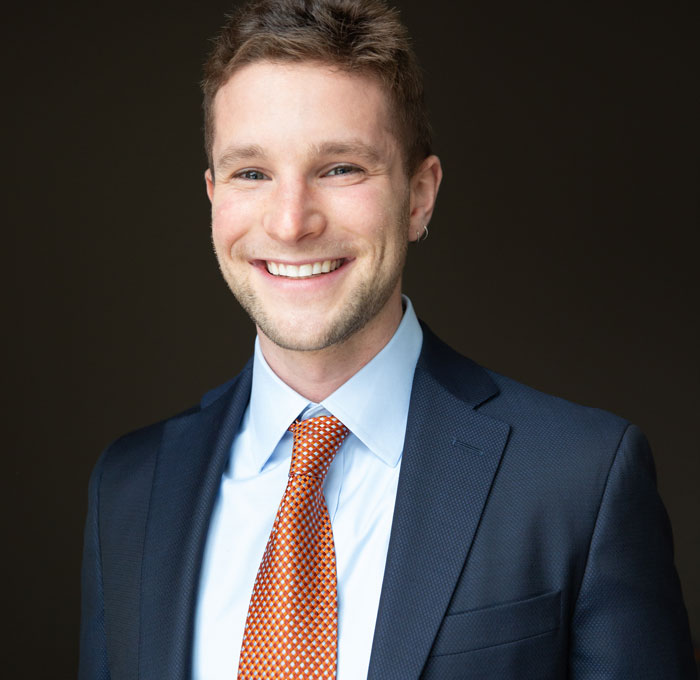
Emmanuel Cantor
ותמנה אדם שידע להלוך עם כל אחד ואחד מהם לפי דעתו
Appoint a person who knows how to walk with each and every person according to their own mind. (Numbers Rabbah 21:15)
When I was little, I imagined my grandfather was the most religious man in the universe. His black velvet kippah, daily prayers, daf yomi learning, and Old-World accent all signified his devotion. Now, if there is one thing I have learned at Hebrew College, it is to avoid “ranking” people by their level of religious practice. Still, had I shared my impression with my grandfather, he would have redirected my attention towards the piety of others — exactly the kind of response one would expect from the most religious man in the universe.
As a little girl, my mother would stay up on Friday nights to say Kiddush with her father when he arrived home from work well after dark. He would set out early the next morning, as Saturday was his most important business day as a peddler. In those years, the most religious man in the universe worked on Shabbat.
Had I been alive then, in postwar Montreal, who would I have wanted to be? For a while, I imagined being my grandfather’s labor organizer, setting up a Shabbat mutual aid society or advocating for a two-day weekend union shop for him and his fellow Hungarian survivors. I still hope to support those who do such work today.
In recent years, I began thinking about how my grandfather felt traveling to and from work on those Friday nights and Saturday mornings. I wondered, as my grandfather walked the maple-tree-lined streets I know well, who he had to talk to about Shabbat, money, family, and all that he had lost. I wondered if he was lonely. I began to imagine being my grandfather’s rabbi.
My grandfather passed away shortly after my acceptance to rabbinical school. Since then, I have learned how to walk alongside others as they find themselves in Torah, the Jewish people, God, and the inevitable vulnerability of being human. “בכל דרכיך דעהו” (Proverbs 3:6) is often translated as “in all your paths know Him,” meaning God, which resonates with my experience of accompanying others as a rabbi. But in these paths, I also know “him,” my grandfather.
As I have been learning to walk alongside others, many people have walked alongside me, supporting me as I grew and continue to grow as a rabbi. To the communities of the Slifka Center for Jewish Life at Yale, Congregation Dorshei Tzedek, and the Jewish Community of Greater Stowe, I am grateful for your trust, partnership, and all that you have taught me. To the faculty of Hebrew College and, especially in this past year, Rev. Dr. Burkhard Weber, Rabbi David Fainsilber, and Rabbi Rim Meirowitz, thank you for being role models and teachers in the deepest sense. I am grateful to my new in-laws, Karen and Shlomo, and to my parents, Esther and Richard, for their gifts of love, support, and belonging in Torah and the Jewish people. And to Shira—katonti mikol hachasadim, I am overwhelmed by the chesed that is you.
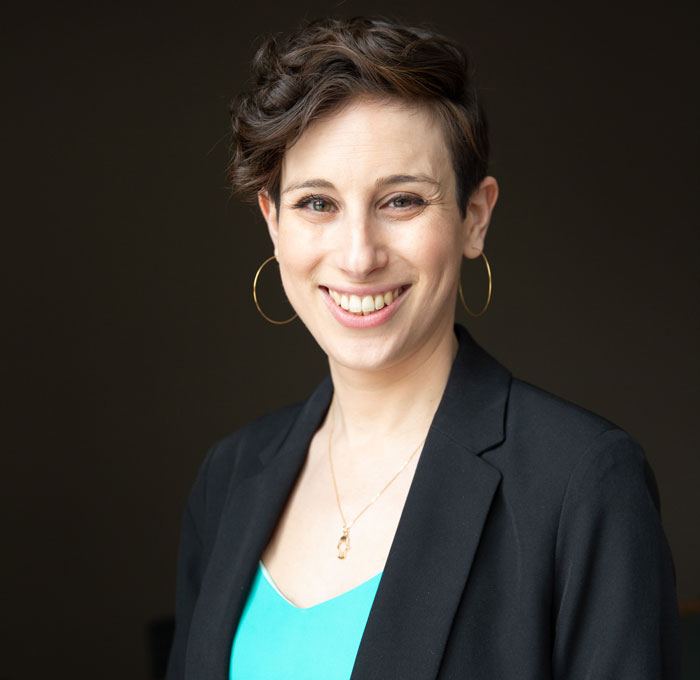
Leah Carnow
ויתרצצו הבנים בקרבה ותאמר אם כן למה זה אנכי ותלך לדרש את ה’
The children struggled in her womb, and she said, “If so, why me?” She went to inquire of God. (Genesis 25:22)
Rebecca is the first person in Torah to “inquire,” lidrosh, of God. The root word darash means not only to inquire, but also to demand, to seek, to consult, and to ask for. In other contexts, it means to study, to practice, to look for answers. The root gives way to words like midrash (ancient interpretations and stories that expound on Torah) and drasha (a sermon).
In the scene with Rebecca, commentators disagree on what is happening as Rebecca goes to seek answers from God. Some say that she prays directly to God; others imagine her visiting a prophet. Either way she takes action in her search for answers; the pain she experiences in her pregnancy pushes her to demand answers from God (which God then provides). Rebecca models an inspiring kind of spiritual seeking, a way of asking questions that are deep and relevant to our own personal experiences. Rebecca teaches us to reach for meaning and connection, especially in times of struggle and difficulty. Though we may not always get answers when we ask, there is power and purpose in the seeking. Judaism encourages this kind of seeking from all of us, at all stages of our lives.
I have been blessed to have spent the past five years of my spiritual seeking at Hebrew College. To my Hebrew College teachers, chevrutot, fellow students, and alumni, as well as my many teachers, mentors, and friends who I learned with in Jerusalem, thank you for your guidance and for your Torah. To my incredible mentors, peers, and communities at Sinai Brookline, Beth Israel Deaconess Medical Center, Nava Tehila, and Temple Beth Zion—thank you for nourishing me, challenging me, and trusting me. To my cohort, you have kept me honest, made me laugh, and made me want to be a better human each and every day we have been on this journey together. I am lucky to call each of you rabbi, my teacher.
I am incredibly grateful to my dear family and friends who have believed in me and supported me every step of the way. So many of you saw me as a rabbi long before I even heard the calling. To Yoni (who also knew I would be a rabbi before I knew), thank you for choosing me and being on this wild ride with me. So much of what I have needed to learn these past five years, I have learned by being in loving partnership with you.
And to the Source of Life, thank you for enlivening me, sustaining me, and bringing me to this incredible moment. I am so blessed to begin this new chapter of seeking.
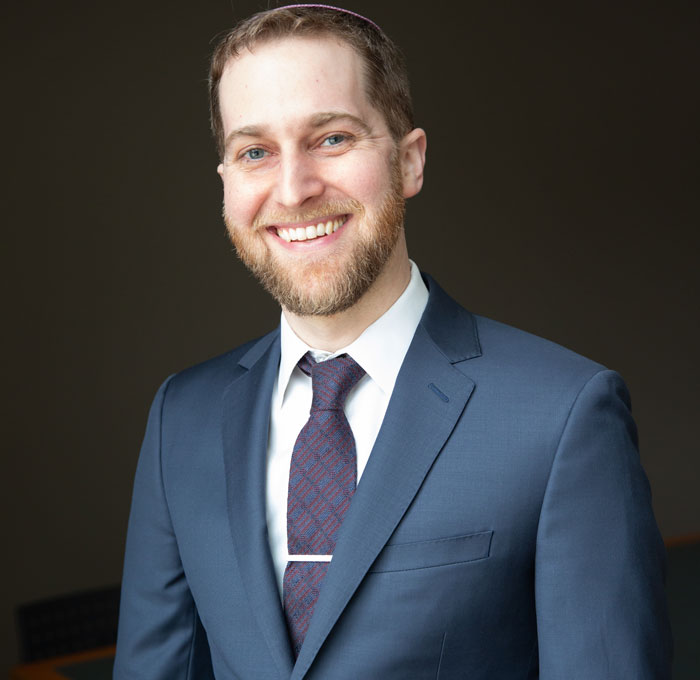
Jacob Chatinover
את־הכל עשה יפה בעתו גם את־העלם נתן בלבם מבלי אשר לא־ימצא האדם את־המעשה
אשר־עשה האלקים מראש ועד־סוף׃
Everything happens right on time; and yet God put a whole world into the mind; but the human will never find out exactly what God is doing, not before and not after. (Ecclesiastes 3:11)
תנו רבנן, שלשה חייהן אינם חיים: הרחמנין, והרתחנין, ואניני הדעת. ואמר רב יוסף: כולהו איתנהו בי
Our Sages taught: three types of people live life that is not life: The compassionate, the hot-tempered, and the delicate. Rav Yosef said: All of these are in me.
I am a person who reads every text through the lens of my own inner experience, and who takes from every piece of Torah some guidance through the inner world. This isn’t necessarily by choice; it seems to be who I am. If you ask me how I am, be prepared: I will tell you. And when I came to Hebrew College, I found a beit midrash full of others who also look for the heart of Torah, who struggle sometimes to navigate a vast inner landscape, and who read the map a little differently from me. I’ve been blessed with many havrusas, conversation-partners, and friends to scout through it together. First, I would like to express my deep love and gratitude to my cohort. You have been the most loving support, the deepest thought-partners, and the best mischief-makers. How lucky I am to have something that makes saying goodbye so hard. I also want to send my deepest love and appreciation to the many students outside of my cohort who have taken time to listen, share, learn, laugh, and cry together. Thank you for choosing to come close. I am grateful that I had many chances to learn with so many people, and I don’t know how to express what it has meant to me that you wanted to see my map, too. Among the things I learned how to do at Hebrew College, I think, is how to pray. Thank you for being a prayerful community; for bringing yourselves, and for asking me to bring myself. I think we have helped each other see farther.
The work I have done to become a rabbi at Hebrew College has been a combination of learning to take myself seriously and understand my worth and potential to help, and also learning not to take myself so seriously, that I am just a person whose reach might exceed his grasp (see Psalms 90:10 and Ecclesiastes 5:1). Somewhere in between those two is where hope lives. The Hebrew College community, students and teachers, has helped me find that message, which I think is my message, the essential piece that I want to share by being a rabbi. Thank you to the faculty and staff, my teachers, and guides, for keeping me humble when I needed it and for receiving me with love and care when I needed it. I also benefited from the generosity of several coaches and counselors, who invested in me and helped me to remember that I am worth investing in. Especially to Ariel Margolis and to Dr. Anthony Tucci — thank you.
I am grateful to my family: My parents who gave me their love of people and of prayer. My brothers, who ground me to reality. My cousins, who’ve been a sounding board as I figure out what it means to speak Torah to people. And my community in Camberville and at Tremont Street Shul, who, like a forest search-and-rescue, help me find my path when I get lost in the trails of the world inside of me. And to my wife and partner, Julia: we are getting really good at this, and without you I would have forgotten why I am here.
To the sacred communities I have served — Teen Beit Midrash and Temple Israel of Portsmouth — thank you for sharing the light of your Torah. To Rabba Claudia and Rabba Kaya, thank you for your mentorship.
I am glad I have reached this point. I don’t know where it leads, and I am proud that that doesn’t scare me as much as it used to. I like who I have become. That is deep, difficult, life-giving spiritual work. I am excited to guide others through it, whether they are as inward-turned as I am by nature or whether they need a little support to look inside. I feel today like a more whole person. I am genuinely excited to be a lighthouse for others, especially those who travel over similarly winding paths.
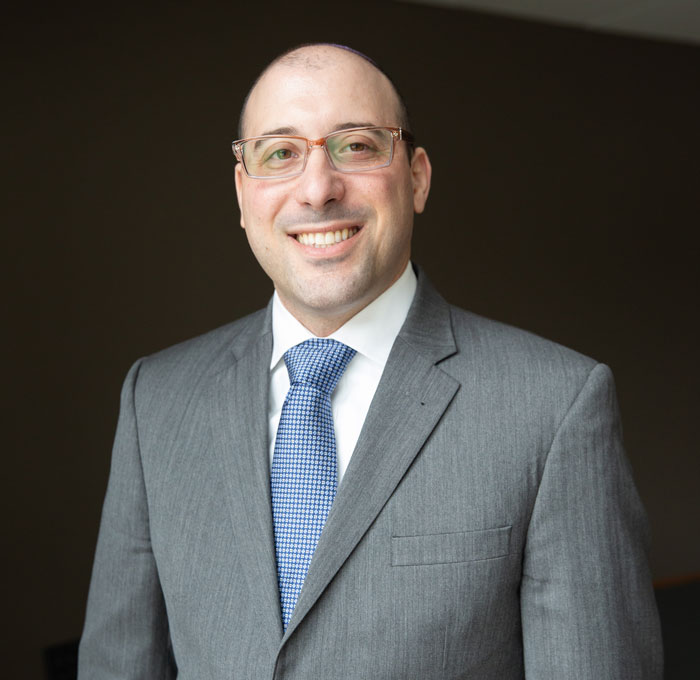
Benjamin Einsidler
רב איקלע לההוא אתרא, גזר תעניתא ולא אתא מיטרא. נחית קמיה שליחא דצבורא, אמר ״משיב הרוח״ ונשב זיקא, אמר ״מוריד הגשם״ ואתא מיטרא. אמר ליה: מאי עובדך? אמר ליה: מיקרי דרדקי אנא, ומקרינא לבני עניי כבני עתירי. וכל דלא אפשר ליה — לא שקלינא מיניה מידי. ואית לי פירא דכוורי, וכל מאן דפשע משחידנא ליה מינייהו, ומסדרינן ליה ומפייסינן ליה עד דאתי וקרי
Rav happened to come to a certain place; he decreed a fast, but rain did not come. The prayer leader descended [to lead the service] before him and recited: “He Who makes the wind blow,” and the wind blew. He continued and said: “And Who makes the rain fall,” and the rain came. Rav said to him: “What are your good deeds?”
He said to him: “I am a teacher of children, and I teach [Torah to] the children of the poor as to the children of the rich. And if there is anyone who cannot pay, I do not take anything from him. And I have a fishpond, and any child who neglects his studies, I bribe him with the fish and calm him, and soothe him until he comes and reads.” (Babylonian Talmud, Ta’anit 24a)
I have long believed that ordinary people are capable of doing extraordinary things, as the story from Masechet Ta’anit above illustrates. We are each unique and singular, yet we are all created b’tzelem Elohim — in the Divine image, which means that we are all capable of changing the world for good. Performing mitzvot that benefits others, I believe, is one of the ways G–d is manifest in our world. When we enact those teachings which we are commanded to do bein adam l’havero — “between one person and their fellow” — we in turn become teachers of Torah through our actions. These acts of hesed, in addition to bringing our genuine selves to our interactions, bring merit to ourselves as well as benefit others. The seemingly inconsequential, everyday things that we do to make the world a better place, whether seen or unseen, can have an impact that reaches beyond ourselves. Those who perform the “mundane” work of ensuring that things are in order as they should be, in whatever capacity, can often be overlooked or seem outshined. Yet this does not mean, G-d forbid, that their actions are any less meaningful or impactful than those of others whose actions appear more prominent. We each can offer contributions that make the world a better place and do the work that our tradition demands we do to build a just society. As we learn in Jeremiah 31:34: “All of them, from the least of them to the greatest, shall know Me.”
It is my firm belief that Judaism has something to offer everyone. All of us are able to find comfort in the Tradition if we but explore and search in it. As a rabbi, I am honored to help others find their own place in our sacred texts, history, and practice. It is a task that I undertake with equal parts pleasure and privilege, due in no small part to my teachers who have been incredible examples of taking pleasure in Torah and giving it over joyfully.
To my classmates: It has been the greatest privilege to learn with you over these last five years. Through times of happiness and sadness, I’ve had the greatest fortune to sit with you in the beit midrash and partake in learning with you. I will forever treasure the Torah that we’ve learned together and that you all have taught me. You are all already incredible rabbis — may we all continue to go from strength to strength.
To Sam, Tamar, and Itai: Words cannot adequately encompass my love and gratitude. The last five years have been a gift which I can never fully repay. Thank you for your faith in me, your unending encouragement, and your eagerness to, as our ketubah says, “build a family in a home full of love and rich with tradition” with me. “Katonti.”
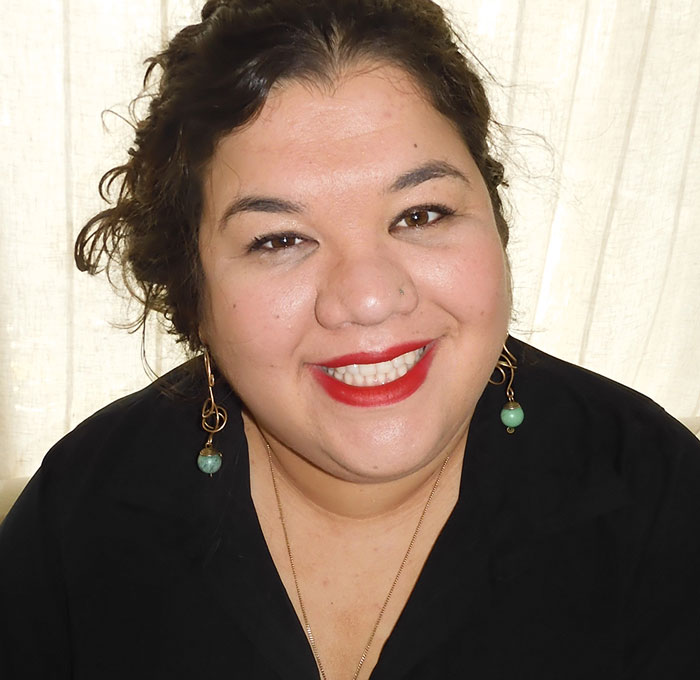
Hindy Finman
In the dynasty of Chabad Rebbes, the following story was told: The Alter Rebbe’s son, Rabbi Dov Ber, with whom he shared a home, would spend many hours (legend has it, over 15 hours a day) studying Jewish texts. One time, he was deeply engrossed in his studies and did not hear the sounds nor the cries of his daughter who had fallen out of her cradle. The Alter Rebbe heard the cries, stopped his own Torah learning to pick up and comfort the child in pain. A bit of time passed, and Rabbi Dov Ber looked up from his learning and noticed his father standing in front of him, not engaged in Torah study. He was surprised by this and asked his father what he was doing in his study. The Alter Rebbe responded, “No matter how engrossed one may be in the loftiest occupation, one must never remain insensitive to the cry of a child.”
For the past five years, I have been the child who has fallen out of her cradle and been picked up by my mentors, faculty, supervisors, chavrutot, and friends over and over again. For the past five years, I have been a student deeply engrossed in my studies with the privilege to tune out all that is around me, practicing intentional selective hearing. And today, as I transition from rabbinical student to Rabbi Hindy Finman, I hear the words of the Alter Rebbe loud and clear — It’s time to step away from my beloved table in the far corner of the beit midrash near the windows and embrace the children who have been crying. It’s time to listen. It’s time to act.
I bless myself and my classmates that no matter how lofty we may become, we remain sensitive and responsive to the cries and laughter of all of God’s children.
Thank you: To the Aibishter (God). To my parents and siblings who have been my #1 support team throughout this process called life. To the many mentors and friends (shout out to the LGHS crew, Philly, and CO) who have cheered me on from the application process to today. To Rabbi Leora Abelson and the entire Nehar Shalom community. To my storytellers at Golda — I love you, and your stories are my Torah! To my chavruta Jacob —may we continue to learn and expand Torah together. To my advisor, Rabbi Jordan Schuster, who instilled in me “kol adam lifi kocho,” “each person according to their energies.” To anyone who listened to my WhatsApp voice notes, especially when the GPS interrupted the note — may the Aibishter shower you with all the blessings. And lastly, to quote Snoop Dogg’s final remarks at his Hollywood star celebration: “I’d like to thank me, I’d like to thank me for believing in me.”
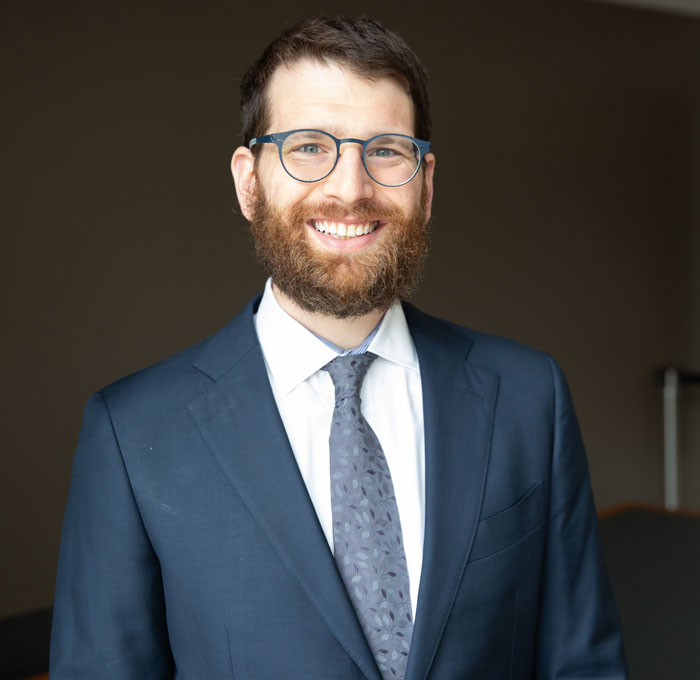
Michael Fraade
הדרן עלך והדרך עלן, דעתן עלך ודעתך עלן, לא נתנשי מינך ולֹא תתנשי מינן, לא בעלמא הדין ולא בעלמא דאתי
We will return to you, and you will return to us; our mind is on you, and your mind is on us; we will not forget you, and you will not forget us – neither in this world nor in the world to come.
The Hadran — traditionally recited upon completing a masechet of Talmud or another major learning project — has long been one of my favorite texts. It speaks to a desire for mutuality and relationality in our approach to Torah, turning text into partner. Torah becomes personified and given explicit consciousness, which she uses to speak with us, to ask us questions, to draw us close. And in that conversation, not only do we open ourselves to the words of the Torah, but the Torah, in turn, opens her heart to our words as well. Our learning, in moments both sweet and challenging, thus makes a claim–not only on us, but on the Torah, on Jewish tradition, and on am yisrael.
The Hadran’s words speak not only to our understanding of what it means to truly learn, but to our relationships with others more broadly. Whether with our friends and families, Hashem, or the Jewish people, we remember and are remembered, change, and are changed, give, and receive gratitude.
Hebrew College has been a delightful place to explore these dynamics over the past four years, deepening my relationship with Torah, God, and an extraordinary community of fellow travelers. The creativity, care, and curiosity that I have seen modeled by my teachers and classmates has shaped my personal practice and my understanding of what rabbinic work can mean, and I hope that I, in turn, have helped others think more deeply and expansively about the questions that are most dear to them.
My time here has been a period of intense study, not only in the traditional subjects of the beit midrash, but of so many broader questions and themes: the deepening of my self-knowledge and spirituality; coming to terms with change and loss; forming, breaking, and repairing interpersonal relationships; the balance between groundedness and change; falling in love and getting married; anxiety, anticipation, and joy. And, of course, the pleasure and privilege of being engaged in the study and enactment of Torah as a full-time pursuit. These are subjects that I have wrestled with and reflected on; and even as I reach this milestone, I know that, just as the Hadran suggests, I will return to them many more times.
I am immensely grateful to the people who helped bring me to this moment. An incomplete list: My teachers, classmates, and havrutot from the past few years, who have pushed and supported me by turn, bringing joy and personal investment to our Torah learning. My Shanah Heh cohort-mates, who have been a source of grounding stability and ample laughter. My internship and job placements, which have helped me find confidence in my own voice. My childhood Jewish institutions, particularly shul, camp, and day school, which laid the foundations for me and so many others. My family, my most constant source of wisdom and silliness, without whom none of this would be possible. KBH, for all the brachot. And finally, to Jenn — I love you so much. Our life and our family are my greatest joy, and I am so excited for all that lies ahead.
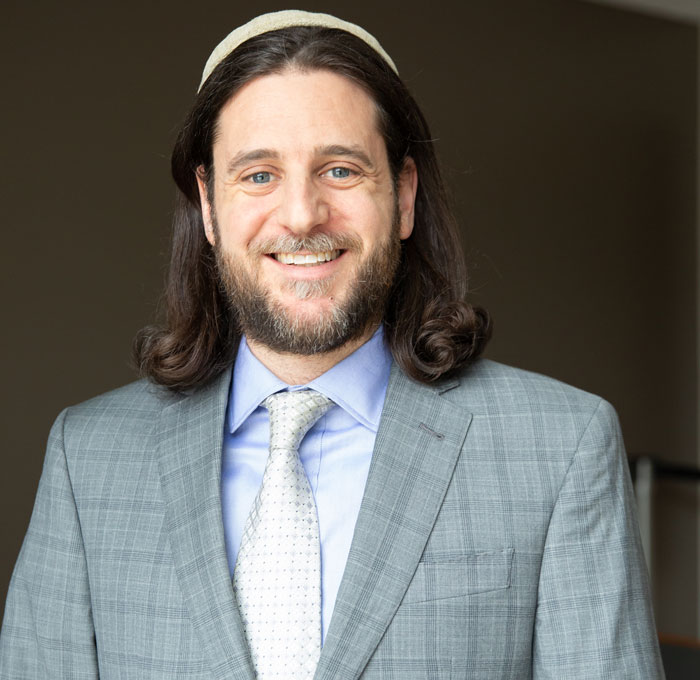
Naftali Hirsch
וייקץ יעקב משנתו ויאמר אכן יש ה’ במקום הזה ואנכי לא ידעתי׃ ויירא ויאמר מה נורא המקום הזה
And Yaakov awoke from his sleep, and he said, Surely G-d is in this place; and I did not know it. He was awestruck and said: How awe-inspiring is this place!… (Bereshit 28:16-17)
When I came to Hebrew College, I had found wonder in G-d’s unfurling Presence — in the world around me, within Jewish practice, and inside myself. I am so deeply grateful to the teachers and peers who helped me encounter the Divine, spurring me to find a way to share these treasures. I could never have done so without my parents, Paula and Steve, and their love; thank you for your tireless support as I wound my way here. I am also deeply indebted to my brother, Jason. Without your guidance, I would be an entirely different person and would have lived less bravely, time and time again. I’m also grateful to my aunts, uncles, cousins, grandparents (z”l), and friends, who have encouraged me, supported me, and helped me reach today. Thank you.
The Me’or Einayim, the Chernobler Rebbe, writes about the ways that even the most heightened spiritual experiences come and go, likening them to the vision from:
“כי החיות רצוא ושוב”, שבא ומסתלק, דהיינו כשהוא מרגיש חיות ותענוג ואחר כך מסתלק ונופל ממדרגתו
“‘For the [mystical] creatures bolted and returned’ Yehezkel (1:14), that they come and disappear, such that one feels vitality and pleasure and then it disappears, and they fall from [this] height.” (Me’or Einayim, Pe’er Kedoshim, Yitro, p. 28) Through the incredible highs and challenges of these five years, I have sought to connect to the Holy Blessed One through the rhythms of deepening and getting lost within tefila and meditation. For the Me’or Einayim, the insights gained from these moments of struggle are key to Receiving Torah anew and continually. For even when all else seems inaccessible, our own pulsing Vitality is there to meet us, a direct experience of the Divine. Especially in those harder moments, I have had so much appreciation for my dear cohort, now colleagues, and all my peers through rabbinical school, who have taught me countless lessons — about humility, about levity, about presence, about so many kinds of Torah. Thank you for the wisdom, the dancing, the deep care, empathy, and so much more. To my dearest ḥevruta, Heather, I have been more myself from our friendship; thank you for all the ways you’ve nourished my growth. To my teachers, thank you for helping me pass through gates and handing me the keys to countless more. You have each helped bring me closer to that Vitality.
I have also grown through the power of serving G-d through Their creatures, offering to hold people in the moments they honored me by sharing. I am so grateful to Reverend Burkhard Weber, my supervisor at Beth Israel Deaconess, along with all my colleagues from that summer — your insights, support, and presence helped me forge a new pathway of offering ḥesed, loving-kindness, which will forever form part of who I am. I am also blessed to have a partner in Michelle, who has supported me through this final year in particular, and whose kindness, curiosity, and faith regularly astound me. I feel so privileged to have been able to serve the incredibly warm community of Shaaray Tefila this year. Connecting with so many beautiful souls has helped shape the kind of Rabbi I can be. Thank you for bringing me into your lives. I also am overjoyed to be bringing all that I’ve learned in my love for Torah and how to share it into the Temple Beth David community, who I know will have so much to teach me.
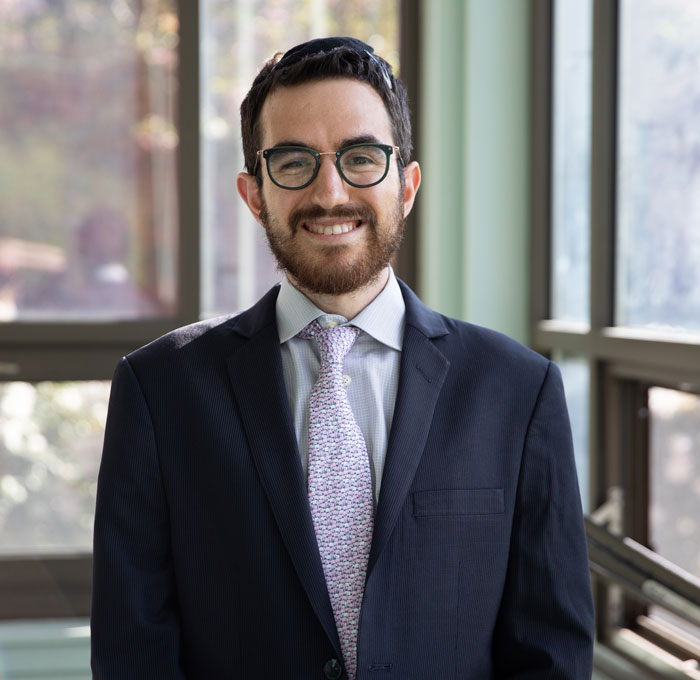
Allen Lipson
ויאמר משה משה, […] אין בו פסק, למה כן, משל לאדם שנתן עליו משאוי גדול, וקורא פלוני פלוני קרובי פרק מעלי משאוי זה
“And God said, ‘Moses, Moses!’” (Exodus 3:4). There is no pausing punctuation [between the two calls to Moses]; why is that? It is comparable to a person who is staggering under a heavy burden and calls out, ‘You! You! Please lift this burden from me.’ (Exodus Rabbah 2:6)
לכל אדם יש את השליחות העליונה שלו לתקן דבר מיוחד, שבעבור זה הורידוהו מן העולם העליון למטה לעוה”ז, ואף אדם אחר מיום בריאת העולם אינו יכול לתקן את אשר עליו לתקן… הוא הדבר שיצר הרע מתגבר עליו ביותר
Each person has descended from the higher realm to this lower world with a holy commission to repair some specific thing that no other person since the creation of the world could possibly repair; […] that is the thing over which the evil impulse fights with them the most. (Netivot Shalom, Devarim, 75)
Several years ago, as I second-guessed my intentions to become a pulpit rabbi, I attended a shiva for a friend’s grandfather. The deceased had studied at yeshiva for 15 years before leaving and becoming a lawyer. “It wasn’t that my grandpa left behind the learning,” my friend said. “The learning just became who he was.”
I think back on this story as I step into the somewhat unconventional post-ordination role of community organizing. My teachers at Hebrew College have gently opened me to the quietly radical possibility that being a rabbi need not mean being what I think the world expects, but simply being myself: trusting that in sifting through my imperfections and my pain I will find the precise task that life demands of me.
Again and again over these exhausting five years — in the dark nights of the COVID-19 lockdown, in the aftermath of October 7th, in my own personal struggles with chronic illness — I have drawn reassurance from the above midrash, which imagines God crying out in overwhelmed desperation, staggering underneath the unbearable burden of human suffering, turning to us for succor. The midrash makes two bold claims. First, there is nothing wrong with crying out since God does it too. Publicly acknowledging our suffering is an act of divine imitation. Second, our duty is to relieve the burdens of others, and in doing so, to relieve God. If we want to know how fully we have heeded God’s call, we must first ask: Whose cries are we hearing, and whose have escaped us? What invisible burdens–personal, social, political–have worn them down and bowed their frames? How can we respond to those cries across what often seem to be yawning chasms of race, class, gender, and belief? Such questions have led me to community organizing as a vocation.
I owe more thanks than I have space to give to the family, friends and teachers who have carried me here. My parents, Jill and Ira, have conveyed a warm, loving, sensitive generosity of spirit that I try every day to embody. My sisters, Mindy and Rachel, have had my back ever since they selflessly agreed to go to a train museum for my sake when I was three. My instructors at Camp Ramah and Prozdor helped me see my Jewishness as a gift worth cherishing. My numerous halakha and Talmud teachers during my time at Hebrew College, the Jewish Theological Seminary, Yeshivat Hadar, and the Yashrut Institute in Jerusalem — to name only a few, Burt, Rabbi Diamond, Yoni Brafman, Rav Aviva, Rabbi Victor, Rav Landes, Shani, Jane, Micha’el, and Devora, all of whom I am proud to call rabbaim — lavished time and patience on my plodding progress. My organizing mentors at UNITE HERE and Faith in Action, including Meir and Rabbi Margie, placed their trust in me and dared me to imagine a different rabbinic life.
May we all leave Hebrew College strengthened in our conviction to carry God’s burdens; and may we each find a task appointed to our whole selves and ourselves alone.
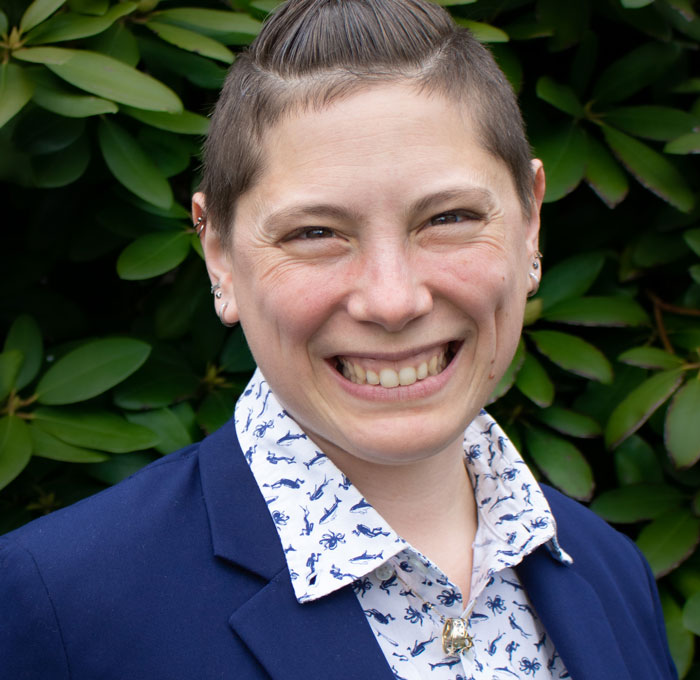
Heather Renetzky
רבי נחוניא בן הקנה היה מתפלל בכניסתו לבית המדרש וביציאתו תפלה קצרה. אמרו לו: מה מקום לתפלה זו? אמר להם: בכניסתי אני מתפלל שלא יארע דבר תקלה על ידי. וביציאתי אני נותן הודאה על חלקי
Rabbi Nechunya ben Hakana would pray a brief prayer when he entered and exited the Beit Midrash (study hall). [His students] said to him: What’s the place of this prayer? He said to them: Upon my entrance, I pray that no stumbling block will come by way of my hand. And upon my leaving, I give thanks for my portion. (Mishnah Brachot 4:2)
I think of Rabbi Nechunya ben Hakana’s prayer not just when coming and going from the beit midrash, but in all areas of my life. This mishnah has become an anchoring force, a way of both calming my nerves and acknowledging accomplishment.
Before I give a drash or officiate a funeral or give advice to a friend: “Please, G!d, keep me from harming or impeding others through an unaware moment or a careless word.”
As I leave an electrifying class or energizing hevrutah or buoying Shabbat dinner: “Thank you, G!d, for giving me the courage to ask that question or the capacity to co-create sacred, joyful spaces.”
I wrote in my Hebrew College application essay, “In being Jewish, I feel connected to something greater than myself…I want everyone who seeks Jewish community to feel that same connectedness, and to feel valuable and valued, worthy of inclusion and included.” Six years later, I still feel a desire deep in my kishkes to foster connection. My greatest hope is that I can remove the stumbling blocks that keep people from entering into Jewish community. My greatest fear is that I will unintentionally place them there myself. I pray to never create these barriers, and that if and when I do, I can clear the way and make it right.
To me, being a rabbi is about embracing my authority while carrying it with thoughtfulness, gentleness, and intention. Rabbinical school has taught me how to balance working hard and knowing that “good enough is good enough.” At the end of these formal years of learning, I know so much more about what I don’t know. But I also know that, b”h, I have and can continue to have the enthusiasm, the heart, and the mind to do this holy work.
Upon this particular “exit,” as I leave Hebrew College, I give thanks not only for my portion but for all of the people who have made this path possible.
My family — For the encouragement, for giving me a hard time in the best way, for the laughs, for the snail-mailed bagels. LYAT!
My friends and hevrutot — For sharpening my thinking (barzel b’barzel), helping me through the AFGO’s, fielding my rabbinic questions, being my drash hotline(s), sharing pajama shabbats, and loving me thourouly [sic].
My teachers, mentors, and colleagues — past, present, and future — For trusting me, for teaching me how to say no, and for empowering me to say yes.
In the words of the Akdamut — דיו אלו ימי וכל מי כנישותא, Were the seas and all waters made of ink, I could not fully thank all of you!
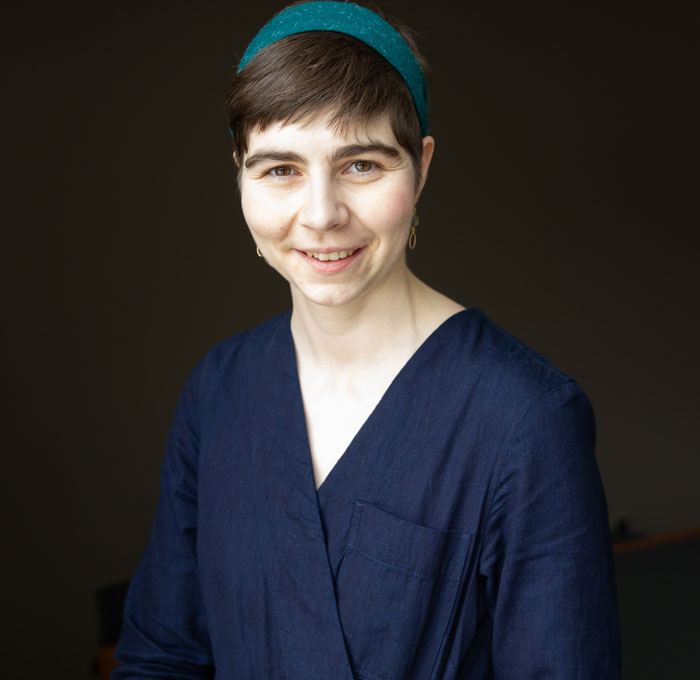
Jessica Spencer
וידבר ה’ אל משה במדבר סיני (במדבר א, א), למה במדבר סיני, מכאן שנו חכמים בשלשה דברים נתנה התורה, באש, ובמים, ובמדבר
“And God spoke to Moses in the Wilderness of Sinai” (Bemidbar 1:1): Why in the Wilderness of Sinai? From here the sages taught that the Torah was given in three ways: in fire, in water, and in the wilderness. (Bemidbar Rabbah, 1:7)
In order to arrive at what you do not know
You must go by a way which is the way of ignorance.
In order to possess what you do not possess
You must go by the way of dispossession.
In order to arrive at what you are not
You must go through the way in which you are not.
And what you do not know is the only thing you know
And what you own is what you do not own
And where you are is where you are not.
— T.S. Eliot, Four Quartets
Fire: sometimes Torah comes with fire and thunder. The whole congregation assembles, and the world changes before them. Someone changes. Sometimes, in a dramatic moment, we cross from not-knowing to knowing.
Water: other times, Torah is the drip of water on stone. When you look west or east to the edge of the Atlantic, each wave makes the barest trace past the last. I have not always felt myself changing over the past four years, and it’s often a surprise when I return to a text I studied and find a penciled note of an Aramaic word I now know intuitively, or I realize how differently I would respond now in an encounter with someone. The tide swells.
Wilderness: the children of Israel’s years in the desert cut their roots in Egypt, let them become as free as the wilderness in which they wandered. My teachers have given freely of their time and wisdom, and I am especially grateful to those who have shown me how they walk in the world. My chevrutas across three continents accompanied me through all the blood, tears, and teaspoons. Special thanks to the baalot maasim who were there when I most needed, and to the communities I am privileged to be tied to. My parents have been willing to camp with me in places they never imagined. Above all, I thank the One who carries me, who goes before me on every road.
What we call the beginning is often the end
And to make an end is to make a beginning.
The end is where we start from.
(T.S. Eliot, Four Quartets)
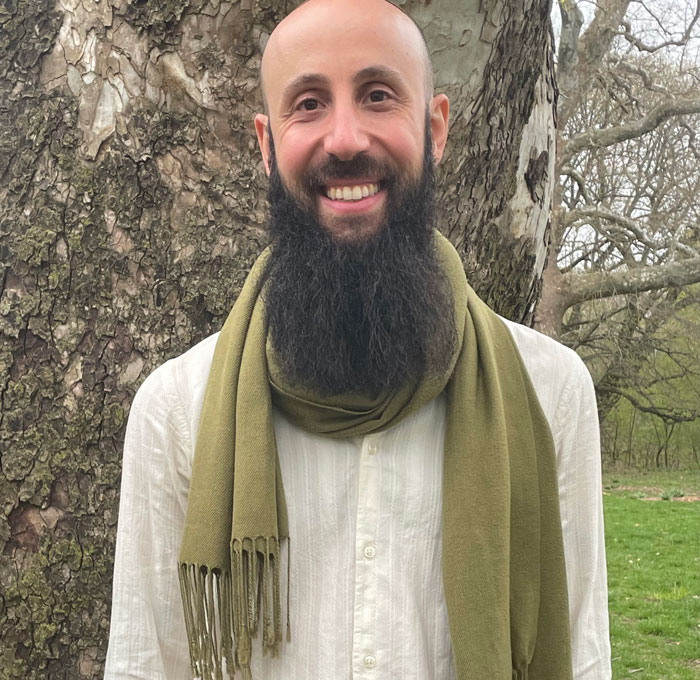
Jacob Weiss
בראשית לב:כה
ויותר יעקב לבדו ויאבק איש עמו עד עלות השחר׃
Jacob was left alone. And a figure wrestled with him until the break of dawn. (Genesis 32:25)
תענית כ ע”א
מיד נכנס רבי אלעזר ברבי שמעון, ודרש: לעולם יהא אדם רך כקנה ואל יהא קשה כארז. ולפיכך זכה קנה ליטול הימנו קולמוס לכתוב בו ספר תורה תפילין ומזוזות.הימנו קולמוס לכתוב בו ספר תורה תפילין ומזוזות
Rabbi Elazar, son of Rabbi Shimon, entered the study hall and taught: A person should always be soft like a reed and he should not be stiff like a cedar, as one who is proud like a cedar is likely to sin. And therefore, due to its gentle qualities, the reed merited that a quill is taken from it to write with it a Torah scroll, tefillin, and mezuzot. (Taanit 20b:3)
Hineni — Here I am, overwhelmed, and feeling all of the feelings fully, as I approach the threshold of rabbinic ordination. As I prepare to cross into this next chapter, I am sitting with the ways in which the past five years have illuminated, and in unrelenting ways, the sometimes very messy and painful nature of our existence. It feels ever more important to be able to be with this turmoil in a real way, engage with it, and do the work to try and transform it, while also steadfastly appreciating and making space for awareness of the profound beauty and grandeur that also permeate our universe. It feels essential to me to maintain a holistic vision of the divine that encompasses all aspects and emotions of life. The pain and also the joy.
“Jacob was left alone. And a figure wrestled with him until the break of dawn.” This verse from Genesis 32 resonated deeply with me as I entered Hebrew College five years ago, captivated by the image it evokes in me, in wrestling with all of our parts — our beauty and easier to love parts, as well as our shadow side, or the parts of ourselves that are harder to engage with or accept. I believe that it is through this continuous act of wrestling that we can achieve some sense of tiferet, a sense of profound integration. This is what drew me to Hebrew College, where I found the community and teachers with whom I wanted to undertake this journey. Now, as I stand on the cusp of stepping out into the world as a rabbi, this verse continues to guide me. Remaining in a state of wrestling energizes me, sanctifies my life, and imbues my brief journey on this planet with meaning. The enduring power within Jacob —and within each of us — lies in our willingness to grapple with the complexities of our human experience. This allows me to see the divine reflected in everyone I meet, and to recognize a piece of myself and others in the divine.
This journey has taught me how to navigate this eternal state of paradox, where multiple truths coexist, and the importance of “staying with the trouble.” Donna Haraway’s words resonate deeply with me: “Our task is to make trouble, to stir up potent responses to devastating events, as well as to settle troubled waters and rebuild quiet places.” I embrace this directive as a framework for engaging with the divine and navigating the dualities of my role as a rabbi. Also remembering to embody the softness of the reed in Masechet Taanit, moving with flexibility and grace, adept at navigating and holding space for a vast array of experiences and perspectives. Through this wrestling, I not only strive toward a personal sense of tiferet — integration and balance — but also aim to extend this harmony to the neshamot, the souls I encounter.
In the verse from Genesis, Jacob is described as being alone. At times, I too have felt alone in this world. However, the past five years have taught me that I am far from alone in my wrestling; indeed, we are all fellow God Wrestlers, and as Reb Zalman says, “the only way to get it together, is together.” The gratitude I feel towards you, Henny, is beyond words. I am the rabbi that I am, in large part because of the learning and work we have done and continue to do together. I am also deeply thankful to my parents and sisters for creating a home that was inclusive, open, discerning, and thoughtful. Additionally, I owe a profound debt of gratitude to my grandparents for instilling in me a boundless love and care for my Yiddishkeit and the Jewish people. Lastly, my heart is full of hakarat ha’tov for the Hebrew College community, my teachers, and especially my chavrutot and classmates. It’s been an incredible journey, filled with challenges and triumphs, and I wouldn’t change a single moment of it.
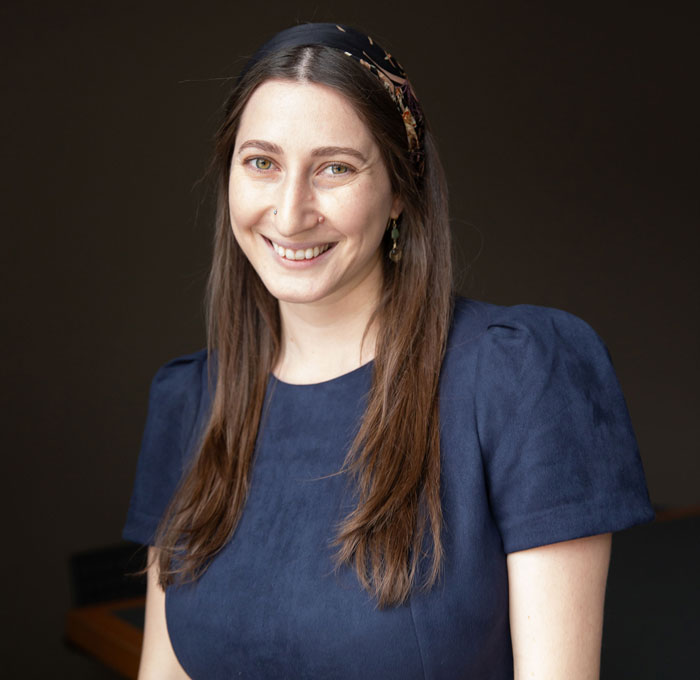
Eliana Willis
משה קבל תורה מסיני, ומסרה ליהושע, ויהושע לזקנים, וזקנים לנביאים
Moses received Torah at Sinai, and passed it on to Joshua, and Joshua to the elders, and the elders to the prophets… (Pirkei Avot 1:1)
ליהודים היתה אורה ושמחה וששן ויקר׃ כן תהיה לנו
The Jews had light, and celebration, and joy, and honor.
So may it be for us. (Havdala Liturgy, based on Esther 8:16)
My ancestors gave me a precious gift. The Hebrew word for tradition is masoret, that which is passed on. This masoret, of Torah, prayer, music, mitzvot, shabbat, holidays, and spiritual practice, fills life with joy and connection. It helps us feel the fullness of life — its rhythms, changes, and constants. It holds us in times of sadness and distress and lifts us in times of joy and celebration. It gives us language to more deeply understand our own experiences, and to weave our own story into a larger tapestry. It connects us to community, the earth, our ancestors, and the Source of Love which flows through all of us.
Our ancestors each found something personal and profound in this tradition. Some light and joy. And they passed it on to us. What a precious gift.
Rabbinical school has been an incredible journey into the depths and textures of our tradition, an exploration of how it can hold and heal. I feel like I have still only touched the surface of this endless, living, changing, tradition. Hebrew College has been an extraordinary space to think creatively and intentionally about how to share the Torah I’ve received, and how to add to it as I take my place in the long chain of this masoret.
Thank you to my hevrutas, classmates, and teachers here at Hebrew College, who have supported, challenged, and inspired me. My Torah is your Torah. Thank you to my internship communities and mentors, at Teen Beit Midrash, The Center for Small Town Jewish Life, and Temple Emunah, for trusting me and teaching me. I am grateful to the many Jewish organizations and communities which have shown me how to live out this tradition, especially Temple Beth Am in Los Angeles, where I first received Torah, and Camp Ramah in the Rockies, where I learned that I have Torah to share.
I am so grateful to my family. To my grandparents, aunts, uncles, and cousins, and in-laws, for always checking in on me and being quick to kvell. To my siblings for being my first and on-going hevrutas. To my parents, for teaching me to love being Jewish, to love learning, and to love life itself. Everything you have taught me has been in living your values yourself, and your support means everything to me. And to Zach, my hevruta in life, for always, always, helping me feel the light and joy.

